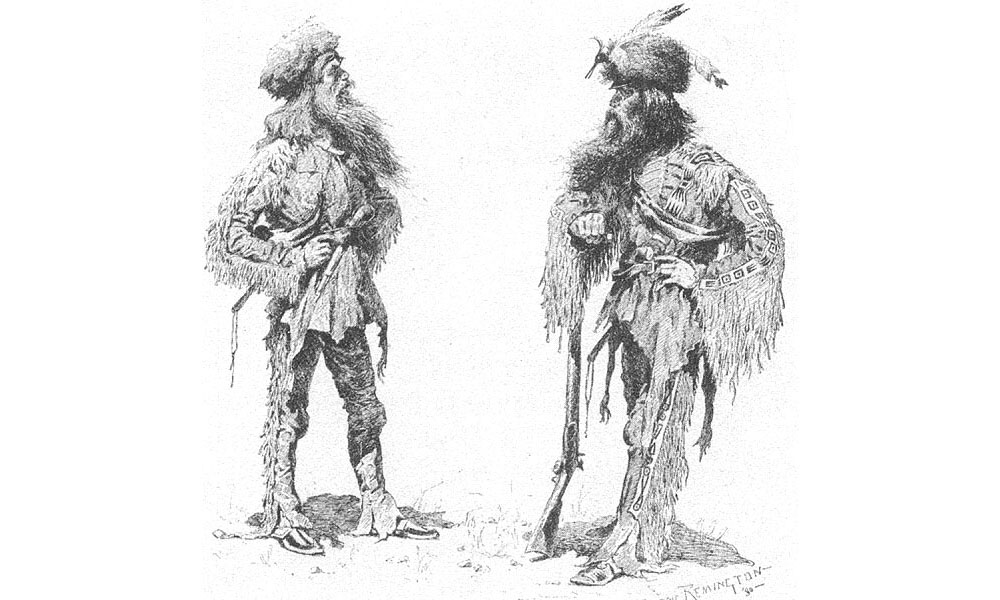Old Bookaroo
Silver Member
- Dec 4, 2008
- 4,472
- 3,781
Who Was Lieut. Emory’s “Londeau?”
Every serious student of the Lost Adams Diggings is familiar with this quote from Lieut. William H. Emory’s 1848 Report:
[October 26, 1848 – near the modern border between Arizona and New Mexico]
“Wherever the eye wondered, huge mountains were seen of black, volcanic appearance, of very compact argillaceous limestone, tinged at times with scarlet from the quantities of red feldspar. Through these the Gila (now swift) has cut its narrow way with infinite labors, assisted by the influx of the Prito, the Azul and San Carlos rivers. As the story goes, the Prieto flows down from the mountains, freighted with gold. Its sands are said to be full of this precious metal. A few adventurers, who ascended this river hunting beaver, washed the sands at night when they haled, and were richly rewarded for their trouble. Tempted by their success, they made a second trip, and were attacked and most of the killed by Indians. My authority for this statement is Londeau, who, though an illiterate man, is truthful.” [Emphasis added]
Back in 2011, I asked on TN how authors knew this brief reference was to the Lost Adams Diggings:
(29) Lieut. Col. William Emorys "Notes" and The Lost Adams Diggings | TreasureNet 🧭 The Original Treasure Hunting Website
There is some good information in the responses.
However, the question remained – Who was “Londeau?”
I’m in the middle of reading The Last Camel Charge, by Forrest Bryant Johnson (2013). I picked it up at the Superstition Mountain Museum in Apache Junction a few weeks ago. I’ve been interested in the US government’s camel experiment for many years – the old camel barracks are nearby in Benica. On page 52 of this book, I came across:
“After guiding Captain Lorenzo Sitgreave’s expedition in 1851 and surviving the Mohave attack, Canadian-born Antoine Leroux considered retiring and becoming a sheep rancher near Taos, New Mexico. But the thirst for adventure bothers a man like Leroux, so when the U.S. Army requested him to lead another expedition, he accepted, happy to serve his adopted country and thrilled with the opportunity to enter the wilderness once again.”
I remembered the reference to “Londreau” in Lieut. Emory’s Report. Was his “Londreau” Antoine Leroux?
Lieut. Amiel Whipple led an expedition to explore the potential thirty-fifth parallel route for a railroad from the Mississippi River to the Pacific Ocean. Whipple’s journal entry for January 21, 1854, states:
“Some of the tributaries north of the Gila are known to contain gold. As late as 1850 or 1851, a party of Americans was organized in New Mexico for the purpose of working placers which were said to exist upon Rio San Francisco, but that name has been applied to so many tributaries of Rio Gila, that I am unable to point out the locality of the one referred to. I think, however, it was that which rises among the Pinal Leño mountains east of the Salinas, and empties into the Rio Gila about twenty miles above the mouth of the San Pedro. One of that company was afterwards employed in my party as a teamster upon the Mexican boundary. He stated that they really found a quantity of gold, but, being surrounded by troublesome Indians jealous of the advance of Americans into their country, and many of the adventurers desiring to proceed to California, the party soon became disorganized, and abandoned their search.” [Emphasis added]
On page 54 of The Last Camel Charge, regarding Whipple’s expedition, is the brief mention:
“In New Mexico, they [the Whipple Expedition] were joined by Leroux.”
I find that evidence convincing. Lieut. Emory, hearing the name of a man he described as “illiterate,” spelt his name phonetically. Emory’s “Londreau” was, in fact, the frontiersman and guide Antoine Leroux. Whipple's Journal confirms it.
As is so often the case, solving one history mystery raises interesting questions. We now know his name – but who was Antoine Leroux?
Did he ever hunt for placer gold along the Gila?
------- o0o -------
Authorities
Authorities
The quotes from Lieut. Emory’s Report and Lieut. Whipple’s Journal are from Rex Arrowsmith’s dandy little book, Mines of the Old Southwest (1963) – little known, but a very informative, compact reference.
For more on Captain Lorenzo Sitgreaves’ expedition, see his Report of an Expedition Down the Zuni and Colorado Rivers, Senate Exec. Doc. , 33rd Congress, 1st Session (1857).
The well-known Lieut. William H. Emory Report is Notes of a Military Reconnaissance, From Fort Leavenworth, in Missouri, to San Diego, in California Including Parts of the Arkansas, Del Norte, and Gila Rivers, 30th Congress, 1st Session, House of Representatives Executive Document No. 41 (1848). You can find here on TN a number of references to it – and to the essential Military Map associated with it – see posts #18 and #27, in particular, in the TN thread cited above.
The full and proper title of Lieut. Amiel W. Whipple’s Journal is Reports of Explorations and Surveys, to Ascertain the Most Practicable and Economical Route for a Railroad From the Mississippi River to the Pacific Ocean, Made Under the Direction of the Secretary of War, in 185-4, Vol. III only, 33rd Congress, 2nd Session, Senate Executive Document No. 78 (1856).
------- o0o -------
Good luck to all,
The Old Bookaroo
Last edited:






